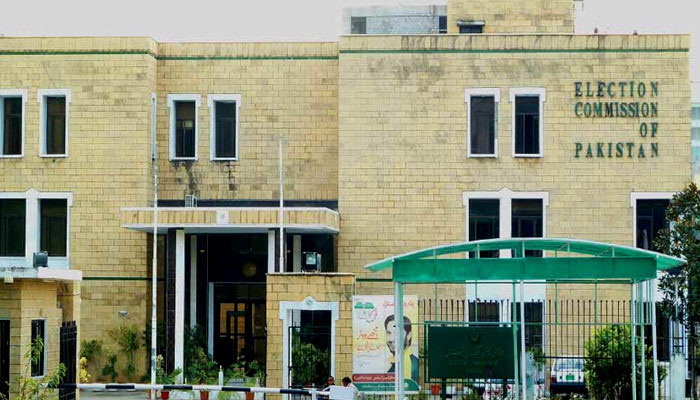ECP postpones Dec 31 local body polls in Islamabad
ECP's five-member bench cancels schedule to hold local government elections in Islamabad
ISLAMABAD: The Election Commission of Pakistan (ECP) on Tuesday cancelled the schedule to hold the local government elections in the federal capital, postponing the polls slated for December 31, after a change in the union councils of the capital territory.
The electoral body last week issued an order to continue the process of holding local government elections in the federal capital, saying that the union councils were increased in violation of the related law.
Today, the ECP announced the decision of deferring the LG polls after a five-member bench reserved its verdict on the local body elections.
At the outset of the hearing, former attorney general Ashtar Ausaf — who is representing the government in the case — informed the bench that the decision to increase the union councils in the federal capital was based on an increase in population.
At this, Chief Election Commissioner (CEC) Sikander Sultan Raja asked whether the census report had been published.
Suggesting the electoral body to look into the rise in Islamabad's population, Ausaf maintained that the census bureau had notified the population growth.
“The Islamabad High Court also recognised the increase in population but authorised the Election Commission to take the final decision after listening to the government's point of view,” Ausaf told the bench.
“In the past, even after the schedule was released, elections were postponed. The Election Commission has to decide according to the constitution and the law,” said Ausaf, adding that the ECP cannot deprive citizens of their fundamental rights.
The lawyer also told the bench that the federal government has passed a legislation on the increase of union councils, adding that ECP must redistribute constituencies in Islamabad.
Meanwhile, a member of the ECP wondered why there was a sudden increase in the population in six months.
The lawyer informed that the government reviewed NADRA's data.
However, CEC Raja said that the delimitation of constituencies was done for Islamabad twice. He also gave the example of Punjab where the exercise was done twice and is now being done for the third time.
“Why did the government not realise at the right time to increase the UCs,” asked CEC Raja. He added that UCs were increased once the election schedule was issued, saying that the government had put ECP in a difficult situation.
“If a mistake is made then the commission should provide assistance,” responded Ausaf. However, CEC Raja reminded the counsel that a mistake is made once not again and again.
“In Article 148 of the Constitution, it is written that elections are to be conducted according to the local law. Now, if that law is changed, then what should be done? There should be such a legislation that local government elections are held on time,” remarked CEC. He added that ECP also faced resistance in provinces over local government elections.
Meanwhile, Justice (retd) Ikramullah Khan, a member of the bench, remarked that general elections are also supposed to be held, and wondered what would happen to the future of local body elections.
On the other hand, CEC Raja said that ECP fears that the government may change the UCs again, adding that the government has to stop this at some point.
On this, Ausaf assured the ECP bench that there will be no changes in the law and wrapped up his arguments.
Babar Awan’s arguments
Meanwhile, PTI’s lawyer Babar Awan told the bench that ECP has already issued the schedule and elections are supposed to be held on December 31, reminding that the law has been changed twice.
Awan said that the ECP was being misled by the government.
“The president has not yet approved the bill,” said Awan, adding that the president may send back the bill to parliament within 10 days with objections while backing the ECP’s views on the local body elections.
The PTI counsel also said that if the president signs the bill then the law can be challenged in court, adding that under Article 264 even if a law is made then elections are to be held under the previous law.
The PTI counsel, while wrapping up his arguments, urged the bench to let the polls happen on December 31.
Ji’s counsel’s arguments
Moving on Jamaat-e-Islami’s (JI) counsel Hassan Javed reminded the bench that the people of Islamabad have been deprived of representation since two years.
He told the bench that his party’s stance was that it was standing with the ECP. He added that IHC in its order did not challenge ECP’s order.
“The high court did not declare the authority, opinion or decision of the Election Commission as wrong. It only said that these parties were not heard, take a decision after listening to them, “said JI’s lawyer.
After listening to all the parties, CEC Raja, while wrapping up the argument, remarked that the voter list has no link with the election schedule. He also asked Ashtar Ausaf whether the president had ratified the bill related to the local bodies.
While another member added that they had always heard that once the president signs a bill then it is turned into law.
However, Ausaf said that the law is also one which is made by the parliament.
The bench after hearing all the arguments reserved its verdict in the case.
-
Security forces gun down 30 terrorists in multiple IBOs in KP: ISPR
-
MQM-P calls for new province in Sindh
-
US report validates Pakistan military edge over India: PM
-
Banned TTP poses serious threat to Pakistan security: UNSC panel
-
CM Afridi clarifies remarks on by-poll after ECP requests army deployment
-
Dubai sees 3.2m Pakistani passengers in 2025 as airport sets new milestone
-
Security forces kill 23 Indian proxy terrorists in KP's Kurram
-
Pakistan to construct island to boost oil exploration: report












